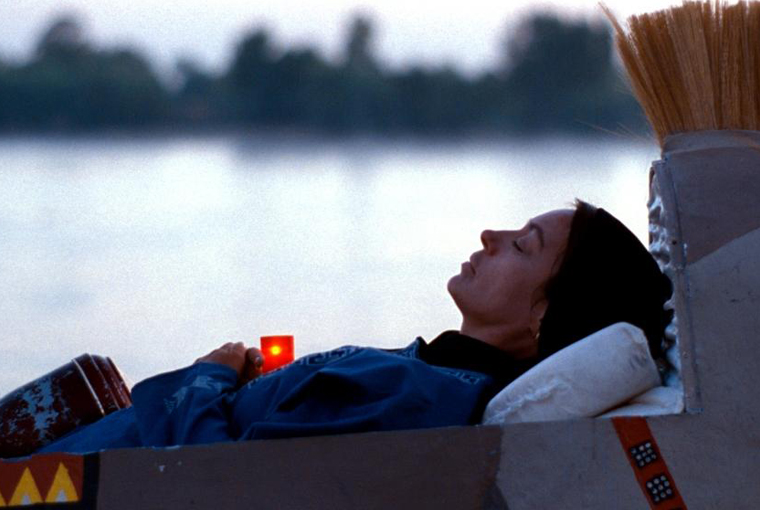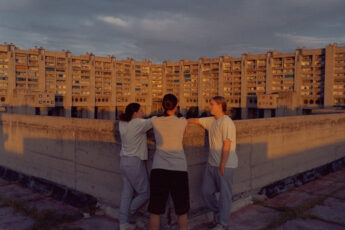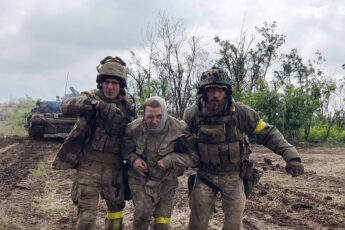
Having premiered in France at the 3rd Romanian Film Festival of Toulouse, Europolis (2009) is an interesting example of contemporary Romanian cinema. This film differs from what has been called Romanian “New Wave”, showing the diversity of the (still) incipient production of the country, that varies between ten to about twenty films a year. Europolis takes place on the road between Romania and France. Nae and his mother find out about the death of his uncle Luca who’s been exiled in France since the start of the communist regime. Both decide to go to France to take care of the funeral. The cultural differences quickly appear, and what we are shown here is a comedy about these clashes.
This is Gheorghita’s first feature film, but it does not follow the minimalistic, hyper-realistic trend of the best-known films of contemporary Romanian cinema. The director himself declares: “I’m in between generations. I’m not as young as the New Wave guys (he is 53 years old), and not as old as the “old guys””. This décalage is clearly seen on the screen. The set design is simple; in the beginning, a family dispute is filmed with a shoulder-mounted camera in a semi-documental way that is frequently used by the “younger” generation. On the other hand, the influence of Mircea Daneliuc’s and Dan Pita’s works can be seen through the use of varuous symbols in the film.
Luca’s brother-in-law is an old, black man. He represents the cosmopolitanism of the Romanian expatriate, enjoying exposure to other cultures, although in Europolis, these cultures clash. His cosmopolitanism would have obviously been very unlikely if he had stayed in the country during the Communist regime, especially in Ceausescu’s era, when it was almost impossible to leave the country, even for a short period of time.
An important symbol in the film is the donkey. Luca wished to be buried in a coffin with the shape of this animal. During the trip, Nae and his mother encounter a blind girl who needs their help to take her donkey across the Romanian border. A biblical figure in itself, this animal carries the dead (including Nae’s mother, who dies suddenly on the way back) during their return to the motherland. The return to the motherland is, according to Gheorghita, the crux of the film. This return, however, only happens with death.
Europolis is also a film about Romania’s place in an almost borderless Europe. On their way back, Nae gets into trouble with the authorities when crossing the Romanian border. This recalls an earlier scene when Nae’s mother cries because she doesn’t want to leave her house, even if the trip to France would be free. Later we learn that Nae actually sold the house in order to pay the trip’s expenses. By the time the two get back to Romania, Nae’s mother is already dead.
The film often questions Romanian patriotism. While one of the characters declares that Romania was “the first” Europe; Nae’s mother asks: “how many of us haves ever been applauded in Paris?”. Thus, it is not only Nae that is moving forward in the film. New notions about Romania also appear during the trip, changing the original concept of Romanian patriotism to a wider, global vision within which the country is considered.
This road trip, with its difficult return to the motherland, shows how a common individual, in contact with other cultures, becomes a citizen of a certain Europolis. This change is not easy, and some are not willing, not prepared, or simply cannot stand this new ‘citizenship’. This is the case for Nae’s mother who dies before being able to return to Romania. It’s also about the sacrifices one makes in order to be in touch with this “Europolis”. However, this is still a controlled “polis” (Romania, not being part of the Schengen area, still has controlled borders with its EU neighbors), and here we see yet another symbol: the Romanian police boats have the inscription “Europolice”, a pun on the title of the film, “Europolis”.
Gheorghita’s film is full of such symbols that build up to a criticism of both Romanian and European mentalities, while the film also reaches its goal of dealing with the myth of the return to motherland. In the end, being a member of a Europolis makes it difficult to return to being a common individual.




Leave a Comment